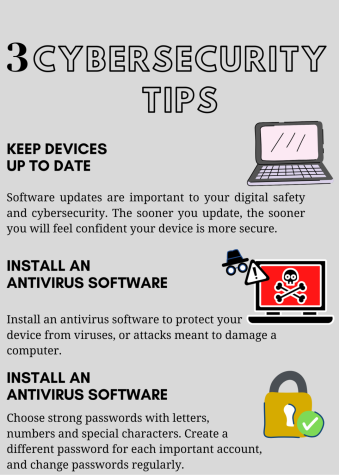Cybersecurity Awareness Month
November 3, 2021
The month of Oct. was Cybersecurity Awareness Month, and there are several aspects students and faculty need to keep in mind when it comes down to protecting themselves on the web.
In broad terms, cybersecurity protects devices, networks, and data from organizations or individuals that could use them to cause harm.
“Without effective cyber security programs and practices, we are all vulnerable to having our private, personal data stolen, ransomed, sold or published illegally,” John Dunning, Vice President for Information Technology, said.
While some people may get frustrated with cyber security like Duo Login, the advantages of cybersecurity include the opportunity for people to use their technology safely for the many great programs that are provided.
“Without cybersecurity, your identity could be stolen, credit cards could be taken, and people could stalk you,” Cailee Brugger, a computer information systems major and network and technology services (NATS) employee, said. “It’s just important to be really careful about what you hide behind passwords. Make sure you have multiple passwords, and don’t put a whole lot out there for people to see.”
According to Dunnings, one of the college’s biggest cyber security concerns is ransomware, which is when software is installed on a network of computers that steals and scrambles data, making it available for attackers but unusable for its owners. These attackers then blackmail whoever they attacked and threaten publishing their information online.
“Today’s most significant threats come from multi-billion-dollar criminal syndicates or state actors like Russia, China, North Korea, and even countries we consider to be geopolitical allies,” Dunning said. “In some cases, offensive cyber weapons developed by our own government have been stolen or gotten out of control, and we have to defend ourselves from those as well.”
Students need to be aware that anyone can get their identities stolen and recovering from that can be very expensive to do.
“The biggest tool bad actors have right now is phishing attacks, so the most important thing all of us can do is be careful, particularly in our email platforms,” Dunning said. “Think before you respond. If an email about paid dog walking, house sitting, or buying iTunes gift cards seems a bit off, think before you respond, even if it appears to be coming from someone you know.”
Some helpful tips for students include never providing a password in an e-mail and always being aware of the link being accessed before clicking on it. These tips can also be beneficial when students enter the work force.
“I am sure most everyone will have to go through some sort of basic cyber security course upon getting hired for a job,” Ben Sadler, an information technology major, said. “Companies want their employees to at least have a basic understanding, so they can be proactive and make smart choices while online in order to help protect not only themselves, but also safeguard company information and the company’s network.”
Some resources for students’ remaining time at college include utilizing NATS and their ability to help with fixing computers, computer issues, Wi-Fi issues, and alerting students of phishing emails. If anyone has specific questions, they are invited to reach out to the Service Center at 402-375-7107 for further assistance.








